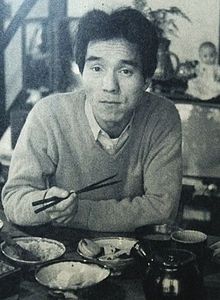fiction.wikisort.org - Actor
Jūkichi Uno (宇野重吉, Uno Jūkichi) (real name Nobuo Terao (寺尾 信夫); 27 September 1914 – 9 January 1988) was a Japanese actor.[1] In 1950, he formed the Gekidan Mingei (劇団民藝) with Osamu Takizawa and others.
This article needs additional citations for verification. (March 2012) |
Jukichi Uno | |
|---|---|
 Uno in 1955 | |
| Born | September 27, 1914 Asuwa-Gun, Fukui Prefecture, Japan |
| Died | January 9, 1988 (aged 73) |
| Nationality | Japanese |
| Occupation | actor |
| Years active | 1932–1988 |
| Children | Akira Terao |
Personal life
He is the father of musician Akira Terao.
Filmography
| Date | Title | Role |
|---|---|---|
| 1948 | Apostasy | Ginnosuke Tuchiya |
| 1949 | Yotsuya Kaidan Part 1 | Yomoshichi |
| 1949 | Yotsuya Kaidan Part 2 | Yomoshichi |
| 1950 | Wedding Ring | Michio Kuki, the husband |
| 1951 | Story of a Beloved Wife | The husband |
| 1952 | The Life of Oharu | Yakichi Ogiya |
| 1953 | Epitome | |
| 1953 | Life of a Woman | Masao, Fujiko's brother |
| 1955 | Wolf | |
| 1956 | Night School | Ryohei's father |
| 1956 | Shirogane Shinjū | Kiichi |
| 1956 | An Actress | |
| 1958 | Sorrow is Only for Women | Kishimoto |
| 1959 | Lucky Dragon No. 5 | Manakichi Kuboyama, the radio operator |
| 1962 | Akitsu Springs | Kenkichi Matsumiya |
| 1964 | Onibaba | The masked samurai |
| 1970 | Fuji sanchō | |
| 1974 | Izu no Odoriko | Narrator |
| 1976 | Tora-san's Sunrise and Sunset | |
Honours
- Medal with Purple Ribbon (1981)
References
- "Uno Jūkichi". Nihon jinmei daijiten+Plus (in Japanese). Kōdansha. Retrieved 7 March 2012.
На других языках
- [en] Jukichi Uno
[ru] Уно, Дзюкити
Дзюкити Уно (яп. 宇野重吉 Уно Дзюкити), настоящее имя: Нобуо Тэрао (яп. てらお のぶお)[1] родился 27 сентября 1914 года в деревне Мондзю, уезда Асува (англ.) (рус. (ныне входит в город Фукуи), префектура Фукуи, Япония — умер 9 января 1988 года в Токио, — японский актёр и режиссёр театра, кино и телевидения. Работал главным образом в независимых кинокомпаниях[2], являлся активным членом Коммунистической партии Японии[3]. Кавалер «Ордена Культуры» (1981)[3].Текст в блоке "Читать" взят с сайта "Википедия" и доступен по лицензии Creative Commons Attribution-ShareAlike; в отдельных случаях могут действовать дополнительные условия.
Другой контент может иметь иную лицензию. Перед использованием материалов сайта WikiSort.org внимательно изучите правила лицензирования конкретных элементов наполнения сайта.
Другой контент может иметь иную лицензию. Перед использованием материалов сайта WikiSort.org внимательно изучите правила лицензирования конкретных элементов наполнения сайта.
2019-2025
WikiSort.org - проект по пересортировке и дополнению контента Википедии
WikiSort.org - проект по пересортировке и дополнению контента Википедии